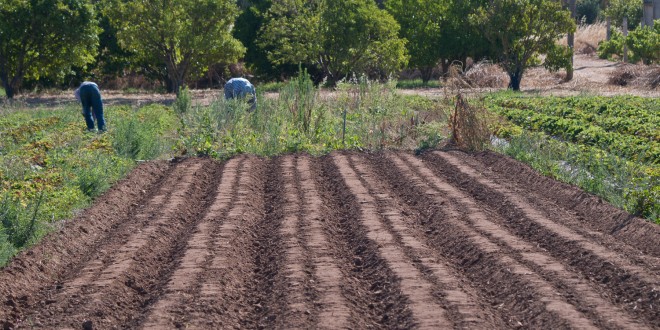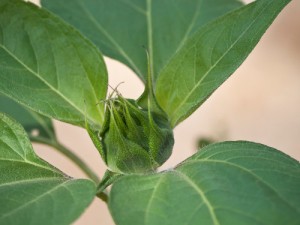 Organic agriculture is not a recent phenomenon and proof of this is that Agrobio, the Portuguese Organic Agriculture Association, has been running for 28 years. According to its president, Jaime Ferreira, the number of people involved in this field has increased, but the total is small. More and more consumers are interested but they have difficulty finding the products easily.
Organic agriculture is not a recent phenomenon and proof of this is that Agrobio, the Portuguese Organic Agriculture Association, has been running for 28 years. According to its president, Jaime Ferreira, the number of people involved in this field has increased, but the total is small. More and more consumers are interested but they have difficulty finding the products easily.
The Algarve has some 3,000 hectares of land certificated for organic farming, with vegetables, fruit and some vineyards close to the coast accounting for quite a small share as compared with pasture and olive groves in the uplands of the serra. In recent years, production of organic wine using organic grapes has begun. Fewer sulphites and the selection of good enzymes are the secret, as well as the use of indigenous grape varieties, which are more resistant to pests.
“It was in the Algarve that organic agriculture took its first steps in Portugal, albeit on the initiative of foreigners,” our interviewee told us. But the hunger for land for building impeded its development. The crisis is enabling it to take off again and there is still high quality land available.”
What does organic agriculture consist of? ECO123 discovered that it is based on not interfering with the structure of the land and the animal life there. Ploughing is avoided. It uses no nitrates, which would also have a harmful effect on the water as a result of leaching. Only manure from animals fed on organic pasture is used. Copper and sulphur are permitted if used in a controlled manner. We came across producers who have different positions on this issue.
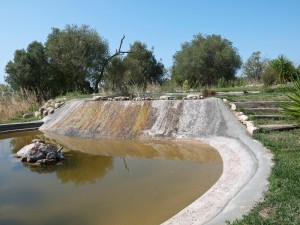
At Quinta do Vale da Lama in Lagos, André Carvalho, training coordinator, speaks of permaculture, or organic agriculture, as the art of “making sustainable life, protecting all living and non-living things. It is based on three principles: caring for people, caring for the land and sharing resources fairly”. For him, everything starts with the in-depth study of all the available resources, followed by the correlation between them to find cycles. “As a methodology, if I am producing vegetables and alongside I have a cow, I have to understand the needs and the results of the vegetables and of the cow and how one can help the other. That’s why a forest which contains trees, shrubs and herbaceous plants is much more stable than an orchard. And stability produces fertility. But, in practice, it is very complex, just as nature is complex. Permaculture leads to productivity by design, introducing species that are productive in each category and are of interest to us.” At the institute, they hold two-week courses, attended by people from different places.
In Portimão, there is a weekly market, on Saturdays in the Praça 1º de Dezembro. Strangely, it is only used by four producers, none of whom is from the municipality.
Carla Moreira from Silves attends the market regularly. Although she’s been practising organic agriculture for her family for a number of years, she was not certificated, and flower growing was her area. She received her certification three years ago, and started producing vegetables, because the flower business was also hit by the crisis. Although limited to two and a half hectares, of which about half always lies fallow, she uses greenhouses for cultivation which allows her to increase production.
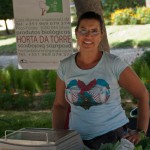 We don’t use herbicides and the weeds are gathered by hand, which means we need a lot of labour and production becomes more expensive.
We don’t use herbicides and the weeds are gathered by hand, which means we need a lot of labour and production becomes more expensive.Carla Moreira
“We don’t use herbicides and the weeds are gathered by hand, which means we need a lot of labour and production becomes more expensive. Without pesticides, much of what we produce cannot be sold because it contains creatures,” she told us. But, because they sell directly, they are able to offer their products to consumers at similar prices to non-organic vegetables. “At the moment, it is not profitable because we do it on a small scale. It is survival agriculture.”
According to our interviewee, the economic climate is also having a negative effect because even the people who attach importance to healthy nutrition haven’t got any money.
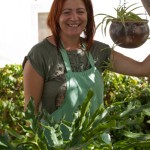 My idea of organic agriculture is producing and selling locally. There is no point in protecting the local environment and then going around polluting it by travelling thousands of kilometres.
My idea of organic agriculture is producing and selling locally. There is no point in protecting the local environment and then going around polluting it by travelling thousands of kilometres.Fatima Torres
Fátima Torres is the face of, and the brains behind, Quinta das Seis Marias (Farm of the Six Marias), in Sargaçal, Lagos. There are 6 hectares worked by 6 women, all of them with Maria in their names. They grow more than 80 types of vegetables, alongside fruit trees and table grapes. Preserving seeds to retain regional characteristics is another of her missions. They produce more than half the seeds that they use for the following crops. “My idea of organic agriculture is producing and selling locally. There is no point in protecting the local environment and then going around polluting it by travelling thousands of kilometres. If everyone does agriculture around a city, this city will be supplied by a group of farmers with much lower costs for everyone. Cheaper and more environmentally friendly. Organic products are a little bit more expensive because of certain production factors like labour,” our guest told us; she swapped her job as an accountant for organic agriculture, a radical change which included an emotional element. No one supported her because she was exchanging a stable job for instability. “And when I told my mother that I was going to do organic agriculture, she nearly died. But it was what made my lifestyle.” Six years later, Fátima is making a profit in the life she embraced. And she’s a happy woman.
Contact:
Agrobio – Associação Portuguesa de Agricultura Biológica
Calçada da Tapada, 39, R/C Dtº – 1300-545 Lisboa
Tel. 213 641 354 / 918 545 115
Website: www.agrobio.pt
e-mail: geral@agrobio.pt
——————————————————————
Fátima Torres Quinta das Seis Marias
Salgaçal – 8600 Lagos
Tel. 916 704 894
Website: www.quintaseismarias.com
e-mail: fatimaptorres@gmail.com
——————————————————————
Carla Moreira Unipessoal, Ldª
Poço Fundo – 8300-000 Silves
Tel. 969 079 374 e-mail: hortadatorre@gmail.com
——————————————————————
Instituto de Permacultura Quinta do Vale da Lama
Vale da Lama – Odiáxere – 8600 Lagos
Tel. 282 764 071 / 913 485 568
Website: www.valedalama.net
e-mail: info@valedalama.net
 Agrobio was founded by a combination of farmers, consumers, doctors and teachers. So it is much more than a typical association of farmers. The aim of producing healthy foodstuffs is complemented by a keen interest in environmental matters and a sound social aspect. At the end of July, it organised the first organic fair in Portimão, complemented by a wide range of technical presentations. On 29th and 30th November, and 1st December, the pavilion Rosa Mota in Porto will be hosting Terra Sã – the National Organic Agriculture Fair.
Agrobio was founded by a combination of farmers, consumers, doctors and teachers. So it is much more than a typical association of farmers. The aim of producing healthy foodstuffs is complemented by a keen interest in environmental matters and a sound social aspect. At the end of July, it organised the first organic fair in Portimão, complemented by a wide range of technical presentations. On 29th and 30th November, and 1st December, the pavilion Rosa Mota in Porto will be hosting Terra Sã – the National Organic Agriculture Fair.
 Eco123 Revista da Economia e Ecologia
Eco123 Revista da Economia e Ecologia

